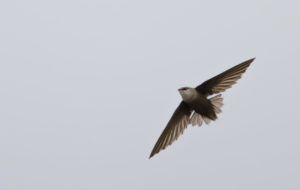
Chimney Swift is a migratory bird that passes through Austin. Image by Zak Pohlen.
Are Migratory Bird Populations Down?
Dr. Maureen Frank, an Assistant Professor & Extension Wildlife Specialist, recently issued a wildlife update based on the several questions she’s received this fall about bird populations. Maureen reports that she’s hearing from backyard birders who have noticed their feeders are awfully quiet, and they are wondering if something is wrong.
It’s Normal for Fall to be Quiet
Fall is a pretty quiet time for birds, especially before the cold fronts arrive. The species that breed in the Austin area in the summer have already moved south. The migratory birds that normally spend the winter here haven’t come down from the north yet. Many migratory species will “ride” down on a cold front, so folks may see some increased numbers now compared to a couple weeks ago.
Fall migration is much less intense than spring migration. In the spring, migrants are rushing to stake a claim on breeding territories, and early arrivals tend to be more successful at breeding and raising young. In the fall, it’s a gradual trickle south since breeding season has already passed and it’s caused more by weather or food availability.
Probably Not Related to HPAI
Dr. Frank doesn’t believe the decreased number of birds has anything to do with the highly pathogenic avian influenza (HPAI; “bird flu”). She says that, yes, wild birds can get avian influenza, but it doesn’t usually have the same impact as we see in the poultry industry. Audubon Texas put out a good release back in the spring when this was a concern: https://tx.audubon.org/aboutus/our-response-avian-flu-concerns.
AgriLife Extension doesn’t have recommendations per se about taking down bird feeders during an HPAI outbreak. Diseases can be transmitted at feeders though, so it’s critical to keep them clean.
Report Your Findings!
Maureen urges backyard birders to contribute their observations to science. She recommends two apps for this: iNaturalist or eBird. Both have easy entry of data so the experts can study it and see if there are actually trends or concerns. This is especially important because some backyard favorites – including hummingbirds – are experiencing severe population declines.
About Maureen Frank

Dr. Maureen Frank is an Assistant Professor & Extension Wildlife Specialist for Texas A&M AgriLife Extension. She provides support to AgriLife Extension county agents and participates in program development, result demonstrations and agent training. She also develops educational materials related to wildlife and conducts applied research projects to address area wildlife management issues. Frank has a Ph.D in wildlife biology from the wildland resources department at Utah State University in Logan, Utah, and a bachelor’s degree in wildlife and fisheries sciences from Texas A&M University, College Station. You can reach Dr. Frank at mgfrank@tamu.edu or by phone at 830-988-6145.
